…for mid-January. It’s not particularly welcome. I like wearing sweaters and jackets.
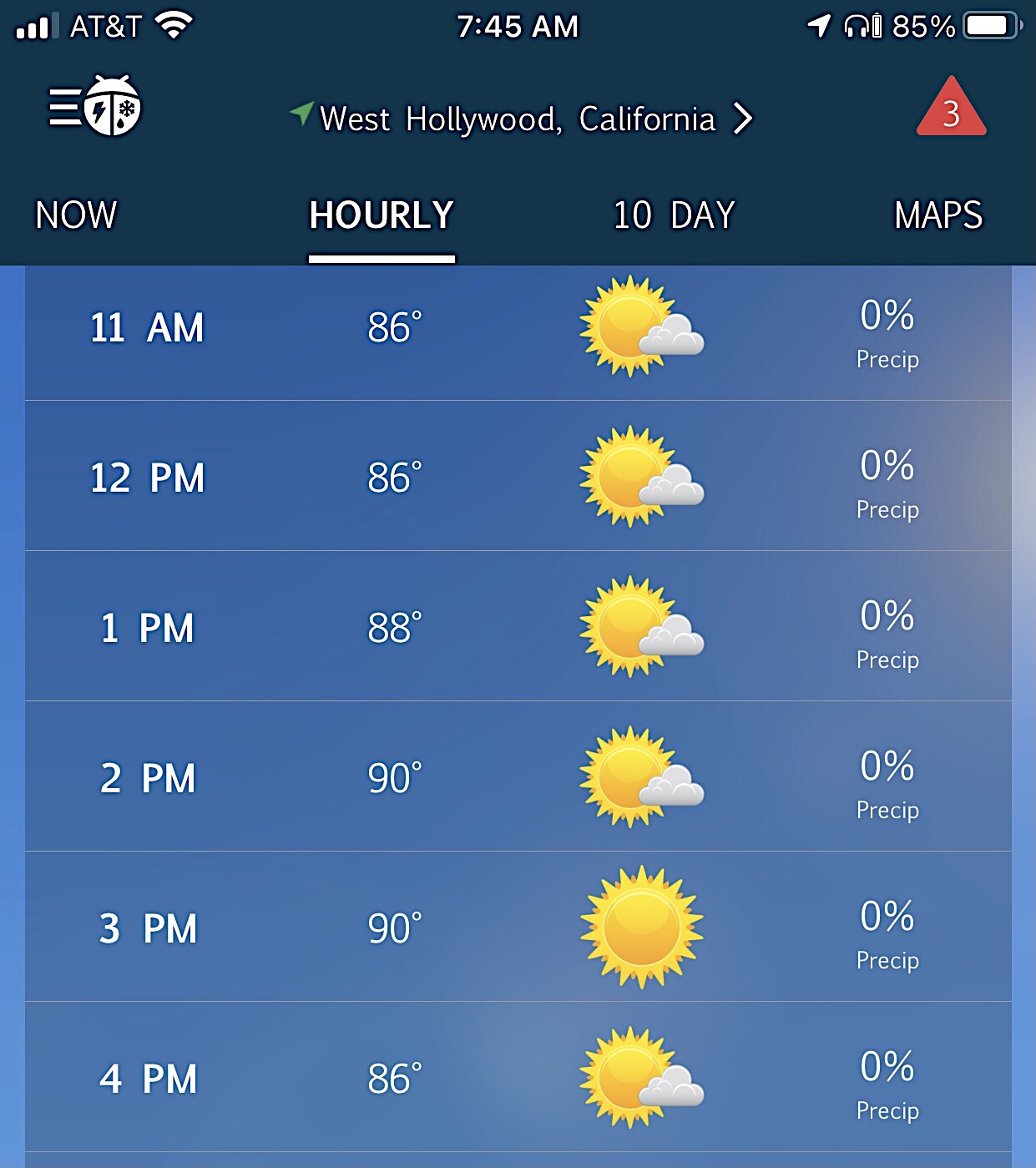
…for mid-January. It’s not particularly welcome. I like wearing sweaters and jackets.

Flimsy and debt-besieged even before the 2016 election, the Trump empire is in even worse shape now.
After the 1.6 Capitol insurrection and yesterday’s Impeachment 2.0, all the big corporate interests consider Trump a pariah and are cutting ties. In terms of his present financial interests (hotels, golf courses) he’s starting to look like a serious loser. Or, if you will, a dead man. No Twitter, no nothin’.
Not to mention the IRS hounds and the coming prosecutions from New York State Attorney General Letitia James and Manhattan District Attorney Cy Vance. If Trump were to liquidate everything he owns, could he even pay off the alleged $400 million he owes? Maybe but then what?
Yes, he could theoretically build a media company upon his 75 million looney-tune rightwing followers, but one way or the other he’s going to spend the rest of his life in court, and gradually — here’s the real killer — the news media is going to lose interest in him.
How much longer will he live with his fast-food diet and all? Ten years? Less?
Incidentally: I like Secular Talk‘s Kyle Kulinski, who’s pretty sharp, can think clearly on his feet and as of last summer had 848,000 YouTube subscribers and roughly a half-billion YouTube views.
But where’s the curtain liner? And what about my Reverent Runt bath mat, for extra traction while showering? Barry Lyndon soap-on-a-rope comes in four different fragrances — sandalwood, Irish tree moss, green aloe and Turnberry spice. And for women, a delicate Lady Lyndon semi-transparent bath shawl for wearing in the bath or under the shower as women of social distinction never bathe naked.
“It was in the reign of George III that the aforesaid personages lived and quarreled; Good or bad, handsome or ugly, rich or poor, filthy or showered, they are all equal now.” — Posted earlier today on Facebook by director-producer-screenwriter Larry Karaszewski.
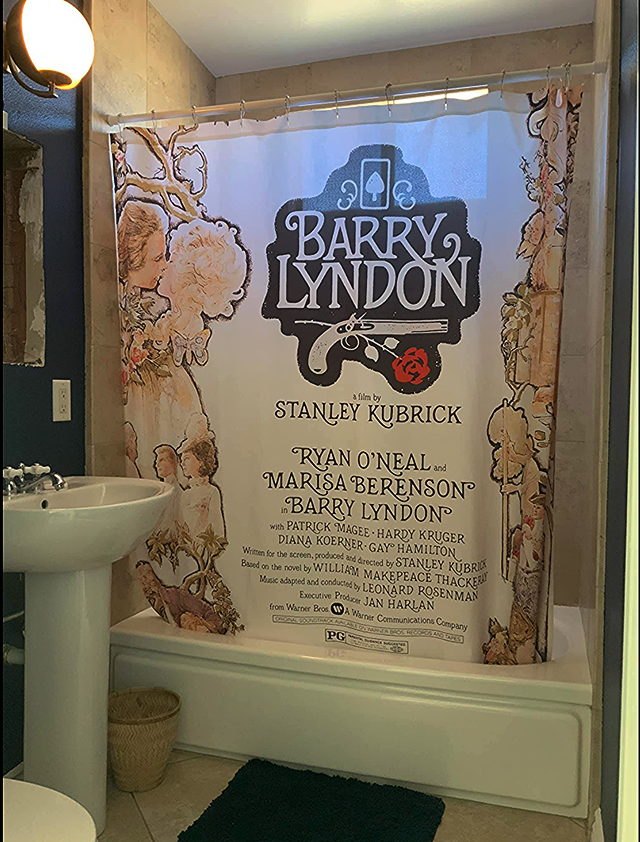
For the first 45 or 50 minutes of Kathryn Bigelow‘s The Hurt Locker, it’s all tension and anxiety, tension and anxiety. Plus a little tension and anxiety.
It’s basically about Jeremy Renner‘s Sgt. James, a bomb-defusing expert but more fundamentally a danger freak and an adrenalin junkie. He doesn’t like flirting with the possibility of being blown to bits — he loves it, or at least the feeling of momentary triumph when he overcomes that threat.
The other two members of the bomb-defusal team — Anthony Mackie‘s Sgt. Sanborn and Brian Gerahty‘s Specialist Eldridge — don’t love flirting with death and pretty much hate James’ recklessness, and there’s the basis of the dramatic conflict.
And then David Morse‘s Colonel Reed arrives on the scene and offers a little comic relief. He’s not appalled by James’ hot-dog behavior — he’s half-amused, perversely tickled, tee-hee. “Well, that’s just hot shit,” he says to James, grinning and beaming like a fan. “You’re a wild man…you know that?”
My favorite moment comes when he asks James how many bombs he’s defused, and James tries to deflect. Reed is having none of it: “Sergeant, I asked you a question.” What follows is pure hilarity, pure relief. Every tension-wracked film needs a guy like Reed to pop in sooner or later.
Said this ten years ago, saying it again: The Hurt Locker needed to end with Renner staring at the rows of cereal boxes in the supermarket. We didn’t need to see him go back to Iraq. The cereal boxes said it all.
Wayne Wang‘s Slam Dance (’87), a sultry mystery noir, was a critical bust and a financial wipeout — it cost a modest $4.5 million to shoot, but only managed a lousy $406,881 gross. The alleged bad guy was producer, screenwriter and costar Don Keith Opper, who reportedly interfered with Wang to such a degree that, according to the Wiki page, Wang tried to get his name taken off the film.
And yet Slam Dance got two things right — (a) the pistol-hot one-sheet featuring costar Virginia Madsen in a skin-tight black gown, and (b) using a music video of Tim Scott McConnell‘s “High Hopes”, a much better song than Slam Dance was a film, for promotional purposes. McConnell wrote the tune in ’85. Bruce Springsteen released a version as part of a same-titled album in 2014.
Which other films were promoted with a music video that was arguably better or at least more engaging than the movie itself?
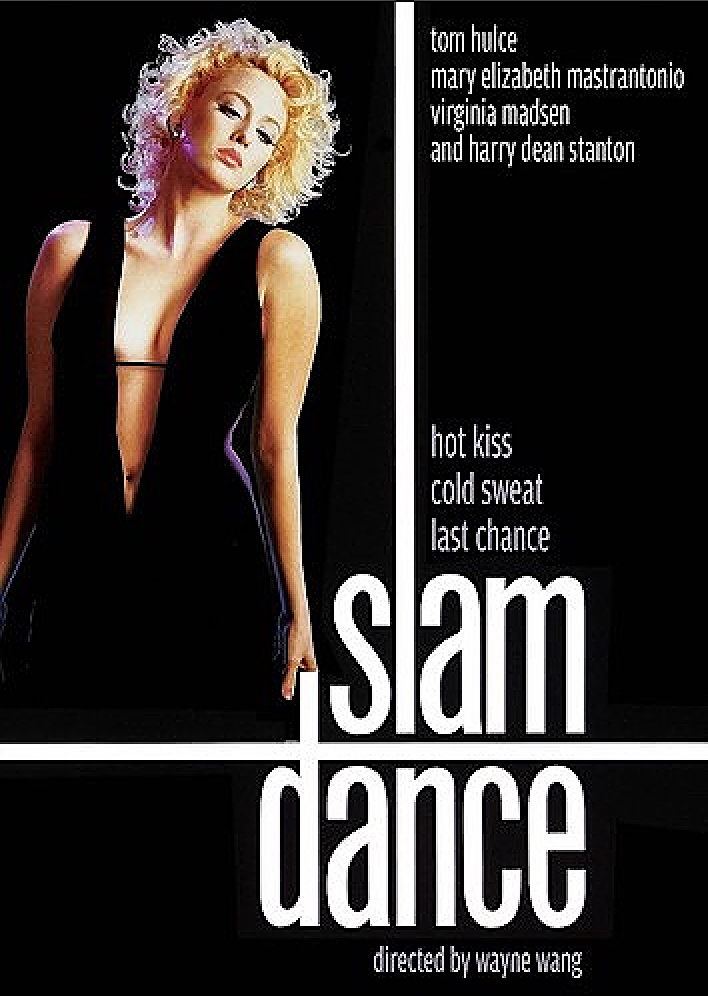
THR‘s Scott Feinberg has posted an interesting “Awards Chatter” discussion with Best Actor contender Ben Affleck, whose performance as a recovering alcoholic in Gavin O’Connor‘s The Way Back is arguably his best performance ever…certainly his most life-reflecting by way of naked revelation.
Standout Affleck quote: “One of the things that happened to me was that I was forced to really honestly look at myself — my failings, my shortcomings, my character flaws — to find accountability, to not hide or run from feelings. And I developed a much greater access — this sounds very actory, so forgive me — to the full range of my emotions. I have had so many more life experiences and so much more to bring to a performance. Now, I feel like a much, much better actor than I’ve ever been. And I love it.”
The Way Back (Warner Bros., 3.6) was the last film I saw in a screening room before the pandemic hit. Here’s my 3.4.20 review, titled “Sincere Muted Respect for ‘The Way Back'”:
Last Friday I mentioned something I’d heard about Gavin O’Connor and Ben Affleck‘s The Way Back, a sports redemption drama about an alcoholic basketball coach. The thing that I heard (and that I shared) is that “it’s not Hoosiers.” I saw it the night before last, and it isn’t.
But you know what? In some ways Brad Inglesby‘s script is as dramatically reputable as Hoosiers — it’s rooted in a real, recognizable, occasionally unfair world of fundamentally decent but occasionally flawed peopleGavin O’Connor’s . And O’Connor’s direction is respectably lean and dutiful, pared-to-the-bone and bullshit-free.
And Affleck’s lead performance…well, he certainly knows what it’s like to be a middle-aged drunk, doesn’t he? That authority and experience filter through. The cynicism, the swearing, the hair-trigger eruptions, the lethargy. It’s acting, of course, but without “acting.” And that’s no small feat.
And the film itself is definitely decent. Not levitational but sturdy. I’m giving it an eight. Not an eight-point-five but an honest eight.
Because, for the most part, it isn’t Hoosiers. It’s a step-by-step story about a guy with a serious problem, and while it’s embroidered and punctuated with basketball issues and strategies and the usual ups and downs, it doesn’t turn on the game. It turns on what Affleck’s character, a divorced construction worker who gives up boozing after taking a coaching gig for the same South Bay basketball team that he gloriously played for in the early ’90s, does about his addiction.
In all my years of searching for color shots of significant films playing in Times Square during the ’40s to mid ’60s heyday, I’ve never come across a full-color snap of the Capitol marquee during the run of From Here to Eternity. Until today, that is. An eventual winner of eight Oscars (Best Picture, Best Director / Fred Zinnemann, Adapted Screenplay, Supporting Actor / Frank Sinatra, and Supporting Actress / Donna Reed), Eternity opened at the Capitol (B’way and 51st) without a premiere and on a sweltering weekend to boot. Plus the Capitol had no air-conditioning.
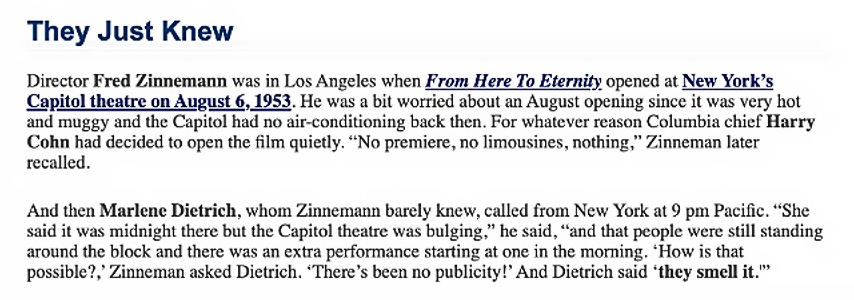
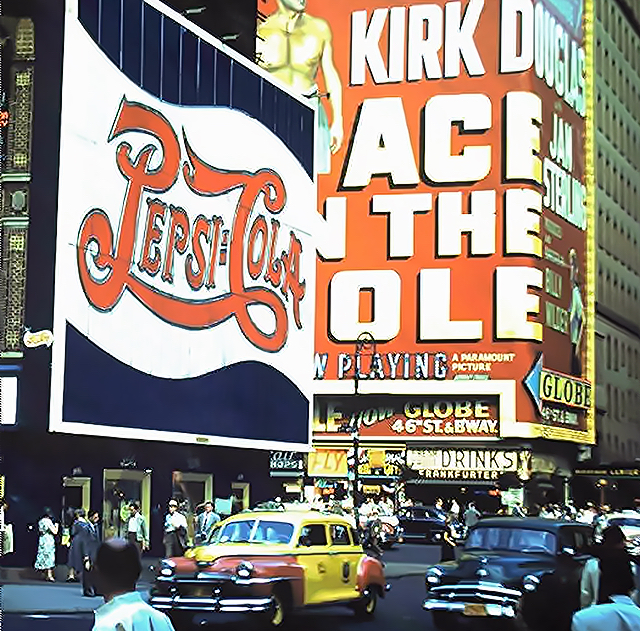
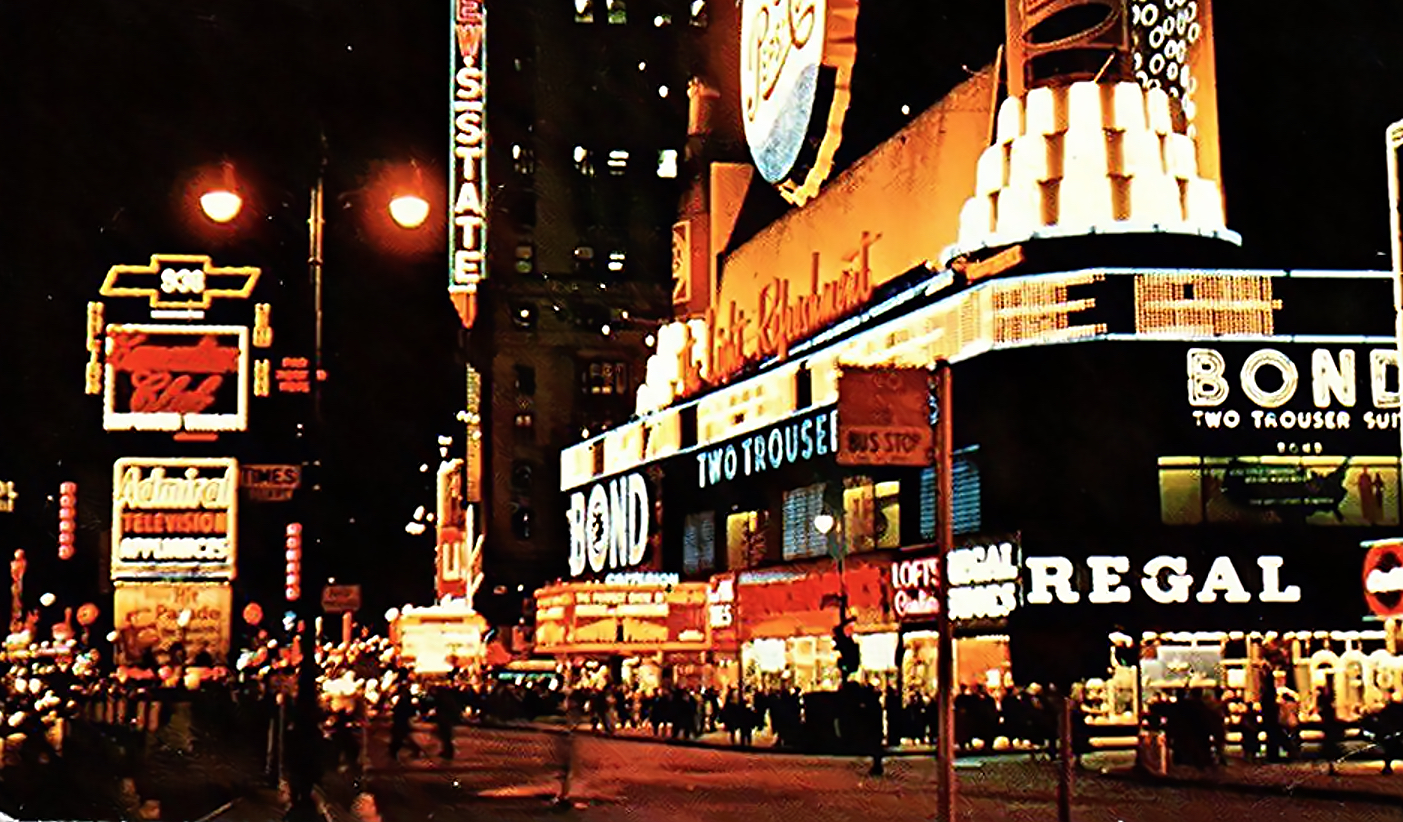
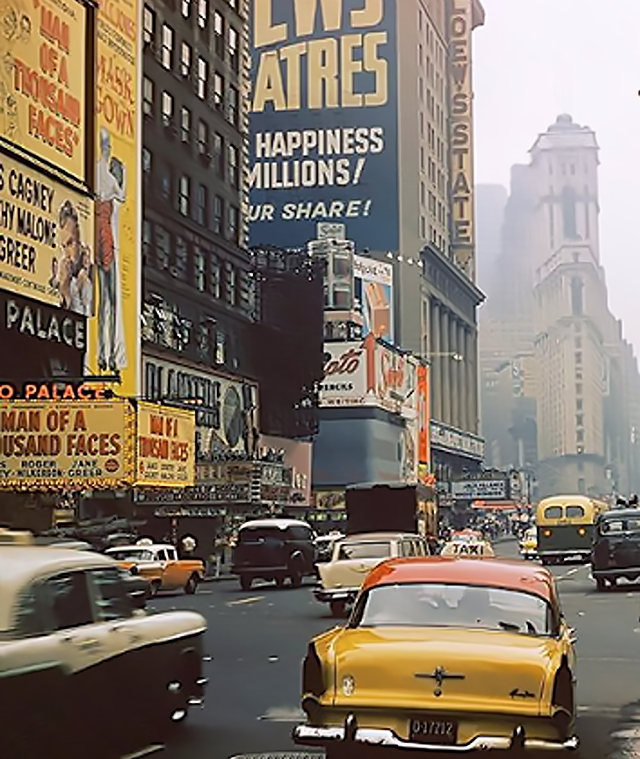
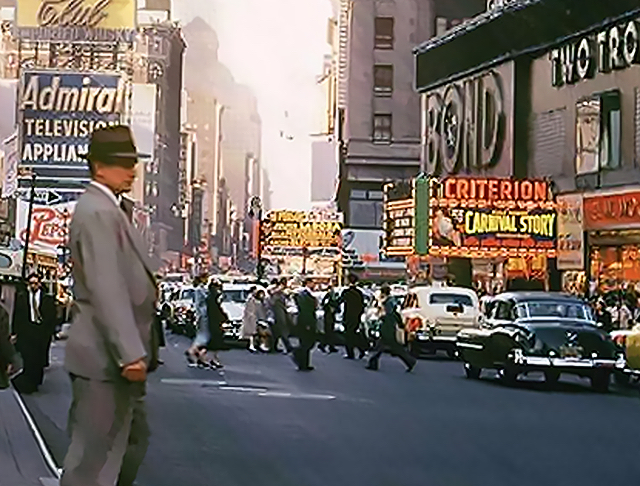
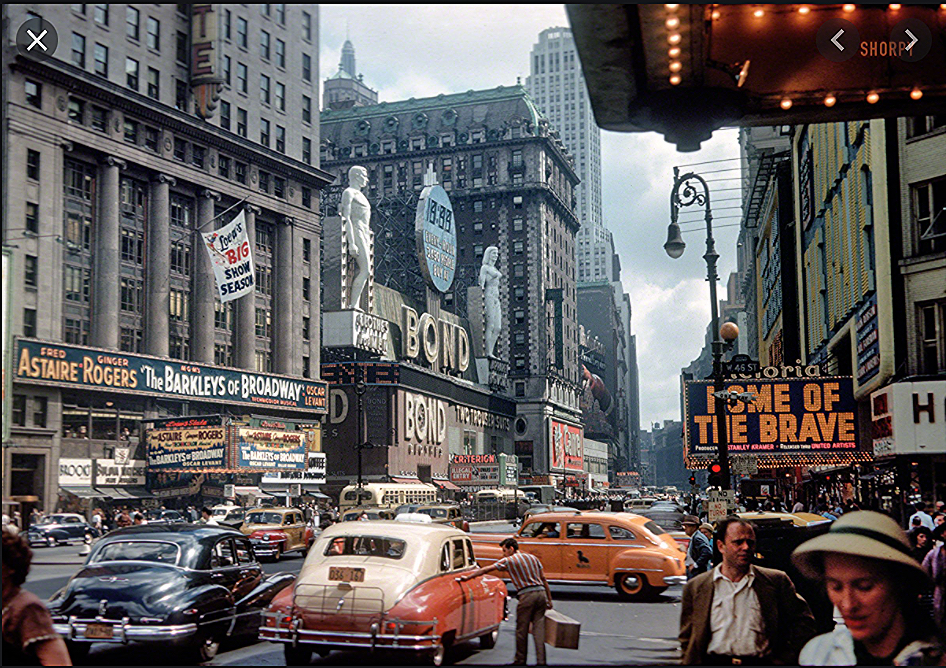
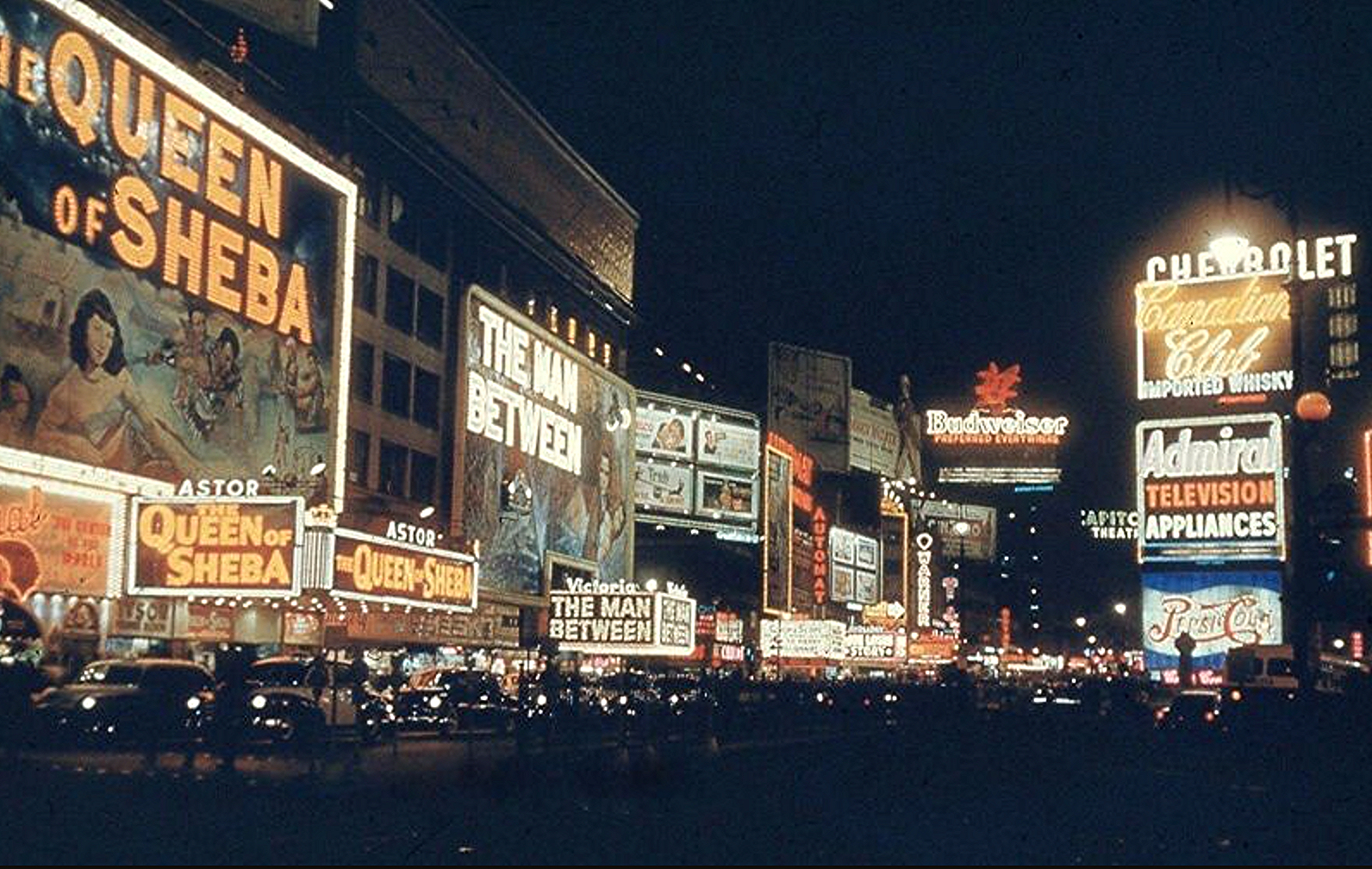
I moved to New York City 25 years ago. I came of age, fell in love, and became a father here. Seeing our City in so much pain breaks my heart.
Let’s fight for a future New York City that we can be proud of – together. Join us at https://t.co/TGnxwuBiHB pic.twitter.com/n9zxPybgbh
— Andrew Yang🧢🗽🇺🇸 (@AndrewYang) January 14, 2021
Several 20something (i.e, Zoomer) students in a film appreciation class were recently asked to share impressions of Citizen Kane, which they’d all been asked to watch. Some remarks have been simplified or edited down and I threw in a few [sic] qualifiers, but what follows is otherwise verbatim:
Student #1: “I personally did not enjoy being confused by this movie. I need to watch the video breakdowns to understand it a little better. I did really like the camera angles and contrast in sizes. I liked Bernstein because he was a nice and ambitious man. I did not know the movie is 20 years away from its 100th year anniversary.”
Student #2: “I enjoyed this film, but I didn’t understand at first why this film has been called a masterpiece. It isn’t uncommon for us [huh?] the film that using multiple character points-of-view. However, at the time Citizen Kane was made the cinematography [seemed] sensational and it effected [sic] a lot of films later years. If I watched this film in the 1940s, I could have different thoughts. I found Susan’s perspective the most interesting. The impression of Kane from other characters’ perspective is [that he was] very confident, bold and sociable. In contrast, Susan’s perspective [tells us that he was] dignified, frightful and authoritative. This is because shooting from low angle intentionally in order to show how Kane looks from Susan. We can know what is Kane actually like or what did he ask for through his life from her perspective.”
Student #3: “Citizen Kane is a very confusing kind of film (in my opinion). I had to watch it twice to even get through it. The main character, Charles Foster Kane, is a very reserved and closed-off person whom nobody could figure out throughout his whole life. The whole movie’s plot threw me off on the whole last word ‘rosebud’ because it waited until the last possible second to tell everyone what it represented. I feel like this movie is an older kind of movie and I am a younger audience, so it didn’t appeal to me as much as any other kind of movie would. To be honest, I would not watch this again. It was way too confusing to me and I felt like they could have made this film way shorter.”
Student #4: “Although I personally liked the movie I completely understand it being a movie that requires a specific appreciation. I found it confusing and I did not really know what was going on. I need to watch it a couple more times to get a better understanding of the movie. I think it did not appeal to me because it was a movie from an older generation and I did not understand what they were talking about. I also feel it was a little long so I did not feel entertained while watching it. I think when I watch it again it will help me better understand it. I did like some of the angles of the shots they took. You could tell they used different styles of filming. I liked Mr. Bernstein the most because he was a really smart man and he was a really good actor. I liked him because he just wanted people to like him back and to help.”
Translation: I really want to detoxify the Trump brand. My family members and business buddies are worried, and so I’m giving this speech to try and turn things around. I especially want to recover the 2022 PGA Championship at Trump Bedminster, which was recently cancelled. That one really hurt. So let’s let bygones by bygones…okay? And forget about Impeachment 2.0. Partisan aggression, nothing more.
— The White House (@WhiteHouse) January 13, 2021
I can’t put my finger on it, but there’s something incomplete about the trailer for Mike Cahill‘s Bliss (Amazon, 2.5). It feels like an Andrew Niccol head-scratcher.
HE to Friendo: “What’s with the flashlight gizmo with the nostril tongs? This is the MacGuffin flip switch, I realize — the transportation device — that’s propelling Owen Wilson and Salma Hayek into a digitally reconstituted reality. But is it…what, just an injection experience that lasts for a few hours or what? Are they actually sitting in some drab apartment the whole time? I’ve watched it twice and I’m not getting the geometry of it. Maybe I’m not intended to.”
Friendo to HE: “Apparently they’re plugging into some AI or VR system a la Strange Days, and you spend most of the movie being teased about which reality is the “real” one, etc.”
Boilerplate: “After recently being divorced and then fired, Greg (Owen Wilson) meets the mysterious Isabel (Salma Hayek), a woman living on the streets and convinced that the polluted, broken world around them is just a computer simulation. Doubtful at first, Greg eventually discovers there may be some truth to Isabel’s wild conspiracy.”
Many exotic overseas locations, but the film was lensed in Los Angeles and Croatia…nowhere else.